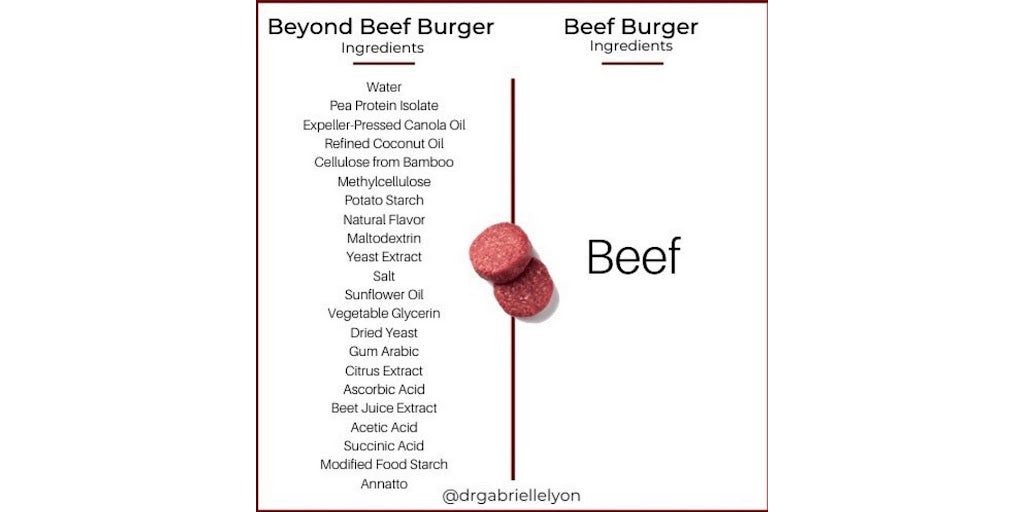
Dismounting the vegan burgers
When something is too good to be true, it probably isn't.
The market for meat substitutes continues to grow enormously, driven by the continuing discourse in favor of a diet based on plant-based products, low in saturated fat and a huge marketing budget.
The two benchmark brands, both with multi-million dollar investments, are Beyond Meat and Imposible Foods.
They both claim that their burgers taste, smell and cook just like a regular beef burger and are of course better for your health and better for the planet.
¿Are they really healthy?
If you consider introducing these plant alternatives into your diet for health reasons, we recommend that you continue reading.
Although it seems obvious, first of all we have to make it clear that a hamburger, with its bread, its french fries and its soda is never going to be healthy no matter how much the beef is organic or is a mixture of tofu and peas. Fast food is not healthy.
It is not the first time that a nutritionally dense food (such as meat) has been replaced by a highly processed variant, historically, this has not had very good results for people's health.
Ingredientes:
|
Organic beef burger |
Beyond Meat Burger (vegan) | Imposible Foods burger (vegan) |
|
Organic beef meat*. *(You have to be very careful when buying the meat for your hamburgers, the ideal thing is to avoid the trays of the supermarket and ask the butcher to chop it for you or buy a 100% beef hamburger ). |
Water, pea protein *, expeller-pressed canola oil, refined coconut oil, rice protein, natural flavors, cocoa butter, mung bean protein, methylcellulose, potato starch, apple extract, pomegranate extract, salt , Potassium Chloride, Vinegar, Lemon Juice Concentrate, Sunflower Lecithin, Beet Juice Extract (for color). |
Water, soy protein concentrate, coconut oil, sunflower oil, natural flavors, 2% or less of: potato protein, methylcellulose, yeast extract, cultured dextrose, modified food starch, soy leghemoglobin, salt, tocopherols mixed (antioxidant), soy protein isolate, Vitamins and Minerals (Zinc Gluconate, Thiamine Hydrochloride (Vitamin B1), Niacin, Pyridoxine Hydrochloride (Vitamin B6), Riboflavin (Vitamin B2), Vitamin B12). |
If it has crossed your mind to put a vegan burger between your chest and back, we are going to explain what some of its ingredients are, because surely you do not know:
- Refined vegetable oils: among many of the potential problems that their consumption produces, their chemical content stands out and they play an enormous role in chronic inflammatory diseases.
- Maltodextrin, dextrose: They are essentially sweeteners with no nutritional value, and they cause a spike in blood sugar.
- Methylcellulose (E461): It is a synthetic stabilizer and thickener, cellulose is not digestible. Methylcellulose is used as a laxative.
- Modified starch: Modified starch is used to confer certain desirable characteristics in foods that native starches cannot provide ... that is, ultra-processed.
- Vegetable Glycerin (E422): Preservative, sweetener and humectant.
- Potassium chloride (E508): Stabilizer and flavor enhancer. It is used as a preservative and can cause digestive problems. As a curiosity, it is one of the three substances used in execution by lethal injection.
- Pea and soy protein: they are considered non-food supplements, so they are not regulated by the FDA (US Food and Drug Administration). These proteins are nutritionally inferior to proteins of animal origin.
And the best for last:
- Soy Leghemoglobin: It is an ingredient designed in the laboratory to mimic the color, bleeding and taste of meat.
To make this ingredient, Impossible Foods genetically engineered a yeast bacteria to produce a protein (soy leghemoglobin) that gives your burger a more "meaty" flavor.
The Impossible Foods hamburger has several genetically modified ingredients.
Nutritional values:
|
Hamburguesa ecológica ternera 113g |
Beyond Meat Burger (vegan) 113g |
Imposible Foods burger (vegan) 113g |
|
|
Energy |
292 Kcal |
250 Kcal |
240 Kcal |
|
Fats |
16,5g |
18g |
14g |
|
saturated |
7g |
5g |
8g |
|
Carbs |
0g |
5g |
9g |
|
sugars |
0g |
0g |
<1g |
|
Protein |
21g |
20g |
19g |
|
Salt |
75mg |
350mg |
370mg |

"Vegetable meat" is not the same as meat, a study shows evidence, click to read.
“Plant-based meat alternatives can look and cook like real meat, but scientists say the nutritional components may not be the same.
Researchers at Duke University compared 36 food samples: 18 from widely known plant-based meat alternatives to 18 grass-fed ground beef options from a ranch in Idaho. For each sample, they measured the amount of metabolites, small molecules that make up the nutrients in food.
The paper, published in the journal Scientific Reports, found that beef contained 22 metabolites that plant-based substitutes did not have. Plant-based meat, meanwhile, contained 31 metabolites that meat did not. The researchers found that the biggest differences were in vitamins, amino acids, and the types of saturated and unsaturated fatty acids found in both food products, among other variables.
However, the study found that several metabolites that have been shown to be vital to human health were found exclusively or in higher amounts in beef, including creatine, spermine, anserine, cysteamine, glucosamine, squalene, and omega-3 fatty acid. DHA, the researchers said." -New York Post- (https://nypost.com/2021/07/08/plant-based-meat-not-nutritionally-the-same-as-real-meat-study/)
Polution:





